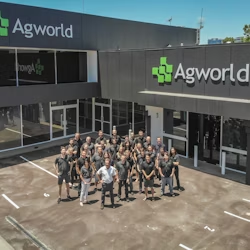There has been a huge increase in agtech development in Australia, with new technologies becoming available on a daily basis. With many products having proven track records to help growers solve their problems and improve their bottom line, why aren’t we seeing a more rapid uptake of digital agriculture in Australia?
What lead me to ponder this topic is a recent report from Israeli Agtech market research company Alpha Brown, which shows that 69% of the 1,490 US farmers they surveyed still rely on pen, paper and non-computerised tools for their record keeping instead of farm management software. Alpha Brown found that only 16.5% of growers use some form of farm management software with the balance using a spreadsheet or general accounting software. Similar research has not been conducted in Australia, but the anecdotal evidence suggests that it’s safe to estimate that Australia’s numbers would be similar or even lower.
So what is driving this lack of adoption? And how can we overcome the barriers? I recently spoke about this topic with Emma Leonard, who is doing a PhD at the University of New England to look at ‘Overcoming the barriers to adoption of digital agriculture’. Although the results of Emma’s PhD research won’t be known until late 2020, Emma has already formed some informed ideas on what could improve the adoption rates: “We really need farmers and developers to understand each other. If developers have a better understanding of what growers need and growers have a better understanding of the capabilities and limitations of software development, we will be able to generate better outcomes for the grower as end user.”
Emma adds to this: “In this relatively young and rapidly evolving area growers are often confused at how to start using digital technology and they need clear reasons to change. Taking a more structured and business-like approach to implementing digital technologies in agriculture, could help and putting this to the test is central to my research.”

Got what it takes to join the Agworld team? We’re looking for talented individuals to help us deliver innovative solutions in agriculture.
“We have seen good uptake of ‘set and forget’ technologies like auto steer but those that require data to be processed and analysed to make decisions have limited uptake. With greater integration between different software and the ability for growers to choose to give data access to agronomists or grain marketers for example is going to start seeing the greater use of practices such as variable rate inputs and blockchain transactions.”
Emma continues: “The purpose of my research is to see how we can engage growers that are keen to adopt digital technologies but struggle to make it happen. By publishing these findings, I hope I can help developers and other service providers understand problems at the farmer’s level. I really want the outcome of my PhD to be useful and practical to a wide range of growers and industry stakeholders. It has already been proven that having key advisors on farm involved in your technology plan helps drive adoption. I think I can contribute to this by working with the whole business team, not just the grower, to help establish and support a planned approach to the introduction of digital approaches to provide solutions for their specific business.”
Agworld fully supports Emma’s research and I personally think that it’s this kind of work that will make a big difference to our industry going forward. I would like to encourage all Agworld users and any other grower that is interested, to contact Emma if you would like to be part of her research project. You can find more information about the project, and Emma’s contact details, here.





